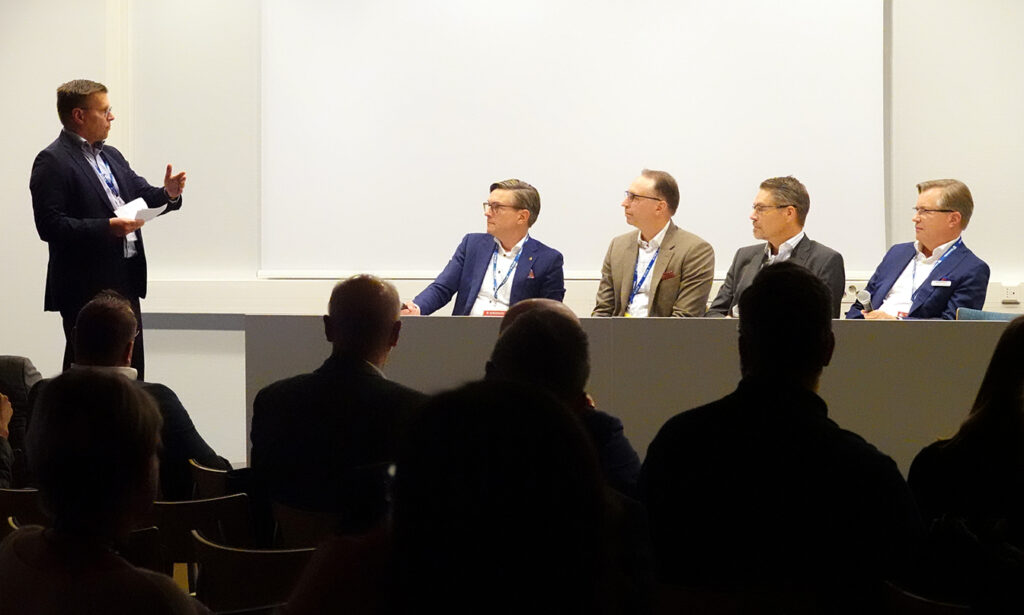“The Competitiveness of Finnish Manufacturing Industry” seminar 27.9.2023 in Tampere
At this year’s Subcontracting Fair in Tampere, MEX Finland had the pleasure of organizing a seminar titled “The Competitiveness of the Finnish Manufacturing Industry”. More than 70 participants engaged actively in the discussions.
Juha Päivike, Director, of Logistics Chain Management of Wärtsilä and Chair of MEX Finland, opened the seminar and moderated the event throughout. We first heard about Bluefors, MEX Finland’s newest member, from their production director Janne Nieminen. Bluefors is the world leader in manufacturing cryogenic measurement systems and other cryogenic product lines for quantum technology and fundamental research in astrophysics, material science, and clean energy. Bluefors is setting the standards for cryogenics through product innovations. Since its early years, Bluefors has been scaling up by introducing industrial manufacturing to the cryogenic sector. Now they are working on a scalable supply chain with truly process-based production including increased automation and the use of cobots. Bluefors is building a solid and sustainable foundation for growth in the long run.
The Open Smart Manufacturing Ecosystems project has been running now for 1.5 years. Christian Sundman, Innovation Manager and Tribe Lead, Wärtsilä, and Risto Raunio, Technical Director, Roima Intelligence presented the OSME project in general and its pilot use cases in particular. In a VUCA world (Volatility, Uncertainty, Complexity, and Ambiguity), agility and flexibility are key enablers for competitiveness. No single actor has the capabilities to keep up with the rapid progress in technologies alone. The global situation also brings more challenges from the security and supply perspective. There is a need for new collaboration models and OSME has focused on improving the sharing of knowledge and expertise while connecting technologies and digital platforms with a high level of trust within the ecosystem.
OSME has produced a number of proof-of-concepts and pilots that prove the benefits of this new way of working. As an example, Risto Raunio presented how the collaborative development of an integration layer has improved the quality of communication-related to issue management and led to faster resolutions. This OSME use case has a clear value-adding role in the cooperation between manufacturing companies.
Jani Savinainen, Supply Chain Manager at Sandvik presented the Smart Manufacturing 2030 Roadmap that has been developed in collaboration with Finnish manufacturing companies and ecosystems. The role of the roadmap is to support the long-term strategies of Finnish manufacturing companies, universities, research centers, and policymakers. The aim is to increase industrial competitiveness and resilience through innovation, knowledge development, and collective impact on the broader society in the field of manufacturing.
Jaakko Hirvola, CEO of Technology Industries of Finland, talked about the competitiveness of the Finnish manufacturing industry, the green transition as a possibility for growth, and digitalization. The need for monitoring, analysis, forecasting, intelligent control, and more granular supply chain control poses challenges for SMEs that are hesitant to invest in the demands of the digital transition. Artificial intelligence, machine learning, generative AI, and language models are also rushing into all areas of work and have the potential to improve decision-making, increase the productivity of expert work and customer service, intelligent management, and automation. To benefit from this, each company must identify the use cases and opportunities that will provide the company with the best result.

The concluding panel discussion, moderated by Juha Päivike, included the panelists Jaakko Hirvola, Tapani Tilus, CTO of Raute, Timo Laitinen, Vice President, BU Rock Drills of Sandvik Mining and Construction, and Jarmo Kuikka, CEO of Tasowheel. The panel discussed the competitiveness of the Finnish Manufacturing Industry from different angles emphasizing stronger integration and closer collaboration throughout the manufacturing value chain.
Based on the panel discussion, the participants continued to exchange ideas for bringing the collaboration to the next level. It was highlighted that increased attention must be given to the way large manufacturers can benefit from the complementary capabilities of their SME suppliers. By becoming better at leveraging upon the strengths of the respective ecosystem members, the end result will benefit all involved. Another important area for further development is the collaboration between industry and researchers. This is a topic that MEX Finland will actively address in its coming activities.